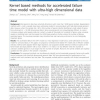Free Online Productivity Tools
i2Speak
i2Symbol
i2OCR
iTex2Img
iWeb2Print
iWeb2Shot
i2Type
iPdf2Split
iPdf2Merge
i2Bopomofo
i2Arabic
i2Style
i2Image
i2PDF
iLatex2Rtf
Sci2ools
130
click to vote
BMCBI
2010
2010
Kernel based methods for accelerated failure time model with ultra-high dimensional data
Background: Most genomic data have ultra-high dimensions with more than 10,000 genes (probes). Regularization methods with L1 and Lp penalty have been extensively studied in survival analysis with high-dimensional genomic data. However, when the sample size n m (the number of genes), directly identifying a small subset of genes from ultra-high (m > 10, 000) dimensional data is time-consuming and not computationally efficient. In current microarray analysis, what people really do is select a couple of thousands (or hundreds) of genes using univariate analysis or statistical tests, and then apply the LASSO-type penalty to further reduce the number of disease associated genes. This two-step procedure may introduce bias and inaccuracy and lead us to miss biologically important genes. Results: The accelerated failure time (AFT) model is a linear regression model and a useful alternative to the Cox model for survival analysis. In this paper, we propose a nonlinear kernel based AFT model...
Related Content
| Added | 28 Feb 2011 |
| Updated | 28 Feb 2011 |
| Type | Journal |
| Year | 2010 |
| Where | BMCBI |
| Authors | Zhenqiu Liu, Dechang Chen, Ming Tan, Feng Jiang, Ronald B. Gartenhaus |
Comments (0)

